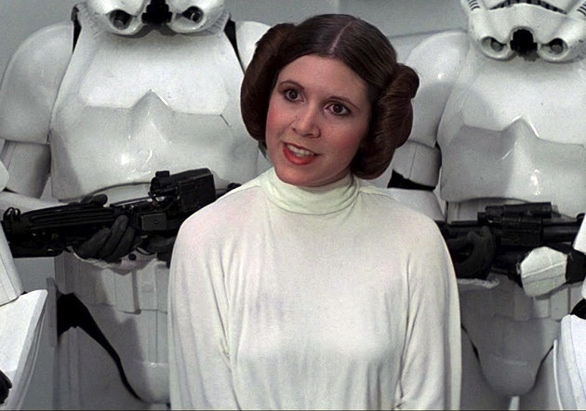[ted id=1650]Colin Stokes’ favorite part of being a dad is sharing movies with his two young children. While his daughter’s favorite is The Wizard of Oz, his son quickly became obsessed with Star Wars after catching a glimpse of the movie at age three.
“It imprinted on him like a mommy duck does on its duckling,” says Stokes. “I wonder what he’s soaking in. Is he picking up on the themes of courage and perseverance and loyalty? Is he picking up on the fact that Luke joins an army to overthrow the government? Is he picking up on the fact that there are only boys in the universe besides Aunt Beru and the princess … who waits around through most of the movie so that she can reward the hero with a medal and a wink?”
In today’s talk, filmed at TEDxBeaconStreet, Stokes takes a look at the messages kids might tease from classic movies like The Wizard of Oz and Star Wars. Stokes says that he feels far more comfortable with Dorothy’s message than with Luke Skywalker’s. He wishes more films championed the ideals that violence isn’t the answer, that goals can be achieved by kindness and that women can be both powerful and wise.
“Why is there so much Force in the movies we show our kids and so little Yellow Brick Road?” Stokes asks.
In his talk, Stokes shares that he uses the Bechdel test, created by Alison Bechdel in 1985, to determine if a kids’ movie is good to share with his children. The test involves asking three questions: (1) Does a movie have more than one woman in it? (2) Do they talk to each other? (3) Is their conversation about something other than a guy?
Stokes believes that the messages in movies do matter, and wonders: could this be one issue at the root of why there are so many sexual assaults in the United States?
“When I hear the statistics, I think, ‘That’s a lot of sexual assailants. Who are these guys? What are they failing to learn?’” says Stokes. “Are they absorbing the story that a male hero’s job is to defeat the villain with violence and then collect the reward, which is a woman who has no friends and doesn’t speak? Are we soaking up that story?”
To hear Stokes plea for dads to show their sons movies with broader definitions of manhood, watch his moving talk. And after the jump, Stokes — who writes the hilarious and insightful media blog, Zoom Out — unpacks the messages he sees in more movies that are favorites for kids.
Writes Stokes:
Plenty of excellent movies fail the Bechdel Test, or imply that heroism is equivalent to a boy becoming a man. Yes, there’s plenty to enjoy and admire in these movies, but if you’re looking for something that shows your children a wider world — and gives your son a wider range of role models — load up some of the masterpieces that push the formulas to more inclusive places:
Movie formula: The Quest
Typical Version: A boy’s world is threatened by an evil male force. He must train and mobilize other boys to defeat the enemy in a violent conflict. There is essentially one female, who is granted to the hero as a prize.
Examples: Star Wars, The Hobbit, The Lion King
Enlightened version: A boy or girl (or team) seeks to heal an injustice in the world. They must make friends who share their goal to change the culture of an older generation, by modeling a better way.
Examples: The Wizard of Oz, The Muppet Movie, The Dark Crystal, Castle in the Sky (Japan), Spy Kids 1 & 2, , Tangled
Movie formula: Finding a Purpose
Typical Version: A boy finds his place among men through mastery of a skill, understanding of competition and teamwork, and/or moving up in the male hierarchy. There is essentially one female, who is granted to the hero as a prize.
Examples: A Bug’s Life, Cars, Ratatouille
Enlightened Version: A boy or girl finds his or her place in a diverse society through self-knowledge and the application of skills to communal goals.
Examples: Kiki’s Delivery Service (Japan), Babe, Stuart Little 1 & 2
Movie formula: The Secret Alien
Typical Version: A young boy comes into contact with a being seen as dangerous by the adult male world, and moves up in the male hierarchy by using the being against shared enemies.
Examples: Iron Giant, How To Train Your Dragon
Enlightened Version: A boy or girl comes into contact with a being seen as dangerous by diverse adult world, and re-orders the world’s assumptions in the act of stewarding it to safety.
Examples: E.T., Lilo & Stitch, Monsters Inc., Secret World of Arrietty (Japan)

Do you think Stokes was too hard on Princess Leia in his talk? He agrees and has issued an official apology. He writes:
A commenter or two has pointed out I was too hard on Princess Leia in my TEDx Talk. I dismissed her as someone who “sits around for the whole movie so she can give the hero a wink and a medal for saving the universe.” While it’s true that the Star Wars galaxy of the original films is Tolkien-like in its gender ratios, I was wrong to throw the leader of the Alliance under the galactic bus.
Check it out the rest of his apology on his blog »
And another great resource if you’re interested in the portrayal of gender in kids’ movies: the Geena Davis Institute on Gender in Media, which this year published an impressive report on the stereotypes of women in film »
Comments (26)
Pingback: Real Kalpa Pharma Gear for Sale
Pingback: Как выбирать правильные фильмы для своих детей: размышления Колина Стоукса | TED RUS
Pingback: Our Kids Need to Know That Girls Can Be Heroes, Too - NEWS | Phones | Nigeria Science | Technology |Computers